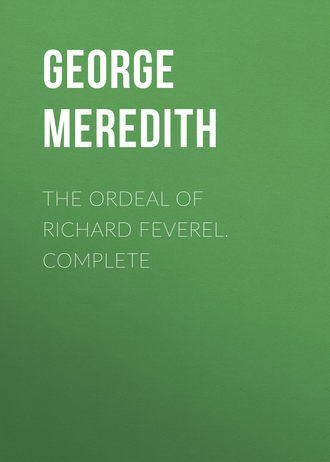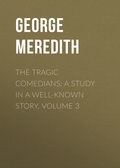
George Meredith
The Ordeal of Richard Feverel. Complete
“Richard! I am not what I was since I knew you. You will not give me up quite?”
“Never, Bella.”
“I am not so bad as I’m painted!”
“You are only unfortunate.”
“Now that I know you I think so, and yet I am happier.”
She told him her history when this soft horizon of repentance seemed to throw heaven’s twilight across it. A woman’s history, you know: certain chapters expunged. It was dark enough to Richard.
“Did you love the man?” he asked. “You say you love no one now.”
“Did I love him? He was a nobleman and I a tradesman’s daughter. No. I did not love him. I have lived to learn it. And now I should hate him, if I did not despise him.”
“Can you be deceived in love?” said Richard, more to himself than to her.
“Yes. When we’re young we can be very easily deceived. If there is such a thing as love, we discover it after we have tossed about and roughed it. Then we find the man, or the woman, that suits us:—and then it’s too late! we can’t have him.”
“Singular!” murmured Richard, “she says just what my father said.”
He spoke aloud: “I could forgive you if you had loved him.”
“Don’t be harsh, grave judge! How is a girl to distinguish?”
“You had some affection for him? He was the first?”
She chose to admit that. “Yes. And the first who talks of love to a girl must be a fool if he doesn’t blind her.”
“That makes what is called first love nonsense.”
“Isn’t it?”
He repelled the insinuation. “Because I know it is not, Bella.”
Nevertheless she had opened a wider view of the world to him, and a colder. He thought poorly of girls. A woman a sensible, brave, beautiful woman seemed, on comparison, infinitely nobler than those weak creatures.
She was best in her character of lovely rebel accusing foul injustice. “What am I to do? You tell me to be different. How can I? What am I to do? Will virtuous people let me earn my bread? I could not get a housemaid’s place! They wouldn’t have me—I see their noses smelling! Yes I can go to the hospital and sing behind a screen! Do you expect me to bury myself alive? Why, man, I have blood: I can’t become a stone. You say I am honest, and I will be. Then let me till you that I have been used to luxuries, and I can’t do without them. I might have married men—lots would have had me. But who marries one like me but a fool? and I could not marry a fool. The man I marry I must respect. He could not respect me—I should know him to be a fools and I should be worse off than I am now. As I am now, they may look as pious as they like—I laugh at them!”
And so forth: direr things. Imputations upon wives: horrible exultation at the universal peccancy of husbands. This lovely outcast almost made him think she had the right on her side, so keenly her Parthian arrows pierced the holy centres of society, and exposed its rottenness.
Mrs. Mount’s house was discreetly conducted: nothing ever occurred to shock him there. The young man would ask himself where the difference was between her and the Women of society? How base, too, was the army of banded hypocrites! He was ready to declare war against them on her behalf. His casus beli, accurately worded, would have read curiously. Because the world refused to lure the lady to virtue with the offer of a housemaid’s place, our knight threw down his challenge. But the lady had scornfully rebutted this prospect of a return to chastity. Then the form of the challenge must be: Because the world declined to support the lady in luxury for nothing! But what did that mean? In other words: she was to receive the devil’s wages without rendering him her services. Such an arrangement appears hardly fair on the world or on the devil. Heroes will have to conquer both before they will get them to subscribe to it.
Heroes, however, are not in the habit of wording their declarations of war at all. Lance in rest they challenge and they charge. Like women they trust to instinct, and graft on it the muscle of men. Wide fly the leisurely-remonstrating hosts: institutions are scattered, they know not wherefore, heads are broken that have not the balm of a reason why. ‘Tis instinct strikes! Surely there is something divine in instinct.
Still, war declared, where were these hosts? The hero could not charge down on the ladies and gentlemen in a ballroom, and spoil the quadrille. He had sufficient reticence to avoid sounding his challenge in the Law Courts; nor could he well go into the Houses of Parliament with a trumpet, though to come to a tussle with the nation’s direct representatives did seem the likelier method. It was likewise out of the question that he should enter every house and shop, and battle with its master in the cause of Mrs. Mount. Where, then, was his enemy? Everybody was his enemy, and everybody was nowhere! Shall he convoke multitudes on Wimbledon Common? Blue Policemen, and a distant dread of ridicule, bar all his projects. Alas for the hero in our day!
Nothing teaches a strong arm its impotence so much as knocking at empty air.
“What can I do for this poor woman?” cried Richard, after fighting his phantom enemy till he was worn out.
“O Rip! old Rip!” he addressed his friend, “I’m distracted. I wish I was dead! What good am I for? Miserable! selfish! What have I done but make every soul I know wretched about me? I follow my own inclinations—I make people help me by lying as hard as they can—and I’m a liar. And when I’ve got it I’m ashamed of myself. And now when I do see something unselfish for me to do, I come upon grins—I don’t know where to turn—how to act—and I laugh at myself like a devil!”
It was only friend Ripton’s ear that was required, so his words went for little: but Ripton did say he thought there was small matter to be ashamed of in winning and wearing the Beauty of Earth. Richard added his customary comment of “Poor little thing!”
He fought his duello with empty air till he was exhausted. A last letter written to his father procured him no reply. Then, said he, I have tried my utmost. I have tried to be dutiful—my father won’t listen to me. One thing I can do—I can go down to my dear girl, and make her happy, and save her at least from some of the consequences of my rashness.
“There’s nothing better for me!” he groaned. His great ambition must be covered by a house-top: he and the cat must warm themselves on the domestic hearth! The hero was not aware that his heart moved him to this. His heart was not now in open communion with his mind.
Mrs. Mount heard that her friend was going—would go. She knew he was going to his wife. Far from discouraging him, she said nobly: “Go—I believe I have kept you. Let us have an evening together, and then go: for good, if you like. If not, then to meet again another time. Forget me. I shan’t forget you. You’re the best fellow I ever knew, Richard. You are, on my honour! I swear I would not step in between you and your wife to cause either of you a moment’s unhappiness. When I can be another woman I will, and I shall think of you then.”
Lady Blandish heard from Adrian that Richard was positively going to his wife. The wise youth modestly veiled his own merit in bringing it about by saying: “I couldn’t see that poor little woman left alone down there any longer.”
“Well! Yes!” said Mrs. Doria, to whom the modest speech was repeated, “I suppose, poor boy, it’s the best he can do now.”
Richard bade them adieu, and went to spend his last evening with Mrs. Mount.
The enchantress received him in state.
“Do you know this dress? No? It’s the dress I wore when I first met you—not when I first saw you. I think I remarked you, sir, before you deigned to cast an eye upon humble me. When we first met we drank champagne together, and I intend to celebrate our parting in the same liquor. Will you liquor with me, old boy?”
She was gay. She revived Sir Julius occasionally. He, dispirited, left the talking all to her.
Mrs. Mount kept a footman. At a late hour the man of calves dressed the table for supper. It was a point of honour for Richard to sit down to it and try to eat. Drinking, thanks to the kindly mother nature, who loves to see her children made fools of, is always an easier matter. The footman was diligent; the champagne corks feebly recalled the file-firing at Richmond.
“We’ll drink to what we might have been, Dick,” said the enchantress.
Oh, the glorious wreck she looked.
His heart choked as he gulped the buzzing wine.
“What! down, my boy?” she cried. “They shall never see me hoist signals of distress. We must all die, and the secret of the thing is to die game, by Jove! Did you ever hear of Laura Fern? a superb girl! handsomer than your humble servant—if you’ll believe it—a ‘Miss’ in the bargain, and as a consequence, I suppose, a much greater rake. She was in the hunting-field. Her horse threw her, and she fell plump on a stake. It went into her left breast. All the fellows crowded round her, and one young man, who was in love with her—he sits in the House of Peers now—we used to call him `Duck’ because he was such a dear—he dropped from his horse to his knees: ‘Laura! Laura! my darling! speak a word to me!—the last!’ She turned over all white and bloody! ‘I—I shan’t be in at the death!’ and gave up the ghost! Wasn’t that dying game? Here’s to the example of Laura Fenn! Why, what’s the matter? See! it makes a man turn pale to hear how a woman can die. Fill the glasses, John. Why, you’re as bad!”
“It’s give me a turn, my lady,” pleaded John, and the man’s hand was unsteady as he poured out the wine.
“You ought not to listen. Go, and, drink some brandy.”
John footman went from the room.
“My brave Dick! Richard! what a face you’ve got!”
He showed a deep frown on a colourless face.
“Can’t you bear to hear of blood? You know, it was only one naughty woman out of the world. The clergyman of the parish didn’t refuse to give her decent burial. We Christians! Hurrah!”
She cheered, and laughed. A lurid splendour glanced about her like lights from the pit.
“Pledge me, Dick! Drink, and recover yourself. Who minds? We must all die—the good and the bad. Ashes to ashes—dust to dust—and wine for living lips! That’s poetry—almost. Sentiment: `May we never say die till we’ve drunk our fill! Not bad—eh? A little vulgar, perhaps, by Jove! Do you think me horrid?”
“Where’s the wine?” Richard shouted. He drank a couple of glasses in succession, and stared about. Was he in hell, with a lost soul raving to him?
“Nobly spoken! and nobly acted upon, my brave Dick! Now we’ll be companions.” She wished that heaven had made her such a man. “Ah! Dick! Dick! too late! too late!”
Softly fell her voice. Her eyes threw slanting beams.
“Do you see this?”
She pointed to a symbolic golden anchor studded with gems and coiled with a rope of hair in her bosom. It was a gift of his.
“Do you know when I stole the lock? Foolish Dick! you gave me an anchor without a rope. Come and see.”
She rose from the table, and threw herself on the sofa.
“Don’t you recognize your own hair! I should know a thread of mine among a million.”
Something of the strength of Samson went out of him as he inspected his hair on the bosom of Delilah.
“And you knew nothing of it! You hardly know it now you see it! What couldn’t a woman steal from you? But you’re not vain, and that’s a protection. You’re a miracle, Dick: a man that’s not vain! Sit here.” She curled up her feet to give him place on the sofa. “Now let us talk like friends that part to meet no more. You found a ship with fever on board, and you weren’t afraid to come alongside and keep her company. The fever isn’t catching, you see. Let us mingle our tears together. Ha! ha! a man said that once to me. The hypocrite wanted to catch the fever, but he was too old. How old are you, Dick?”
Richard pushed a few months forward.
“Twenty-one? You just look it, you blooming boy. Now tell me my age, Adonis!—Twenty—what?”
Richard had given the lady twenty-five years.
She laughed violently. “You don’t pay compliments, Dick. Best to be honest; guess again. You don’t like to? Not twenty-five, or twenty-four, or twenty-three, or see how he begins to stare!–twenty-two. Just twenty-one, my dear. I think my birthday’s somewhere in next month. Why, look at me, close—closer. Have I a wrinkle?”
“And when, in heaven’s name!”…he stopped short.
“I understand you. When did I commence for to live? At the ripe age of sixteen I saw a nobleman in despair because of my beauty. He vowed he’d die. I didn’t want him to do that. So to save the poor man for his family, I ran away with him, and I dare say they didn’t appreciate the sacrifice, and he soon forgot to, if he ever did. It’s the way of the world!”
Richard seized some dead champagne, emptied the bottle into a tumbler, and drank it off.
John footman entered to clear the table, and they were left without further interruption.
“Bella! Bella!” Richard uttered in a deep sad voice, as he walked the room.
She leaned on her arm, her hair crushed against a reddened cheek, her eyes half-shut and dreamy.
“Bella!” he dropped beside her. “You are unhappy.”
She blinked and yawned, as one who is awakened suddenly. “I think you spoke,” said she.
“You are unhappy, Bella. You can’t conceal it. Your laugh sounds like madness. You must be unhappy. So young, too! Only twenty-one!”
“What does it matter? Who cares for me?”
The mighty pity falling from his eyes took in her whole shape. She did not mistake it for tenderness, as another would have done.
“Who cares for you, Bella? I do. What makes my misery now, but to see you there, and know of no way of helping you? Father of mercy! it seems too much to have to stand by powerless while such ruin is going on!”
Her hand was shaken in his by the passion of torment with which his frame quaked.
Involuntarily a tear started between her eyelids. She glanced up at him quickly, then looked down, drew her hand from his, and smoothed it, eying it.
“Bella! you have a father alive!”
“A linendraper, dear. He wears a white neck-cloth.”
This article of apparel instantaneously changed the tone of the conversation, for he, rising abruptly, nearly squashed the lady’s lap-dog, whose squeaks and howls were piteous, and demanded the most fervent caresses of its mistress. It was: “Oh, my poor pet Mumpsy, and he didn’t like a nasty great big ugly heavy foot an his poor soft silky—mum—mum—back, he didn’t, and he soodn’t that he—mum—mum—soodn’t; and he cried out and knew the place to come to, and was oh so sorry for what had happened to him—mum—mum—mum—and now he was going to be made happy, his mistress make him happy—mum—mum—mum—moo-o-o-o.”
“Yes!” said Richard, savagely, from the other end of the room, “you care for the happiness of your dog.”
“A course se does,” Mumpsy was simperingly assured in the thick of his silky flanks.
Richard looked for his hat. Mumpsy was deposited on the sofa in a twinkling.
“Now,” said the lady, “you must come and beg Mumpsy’s pardon, whether you meant to do it or no, because little doggies can’t tell that—how should they? And there’s poor Mumpsy thinking you’re a great terrible rival that tries to squash him all flat to nothing, on purpose, pretending you didn’t see; and he’s trembling, poor dear wee pet! And I may love my dog, sir, if I like; and I do; and I won’t have him ill-treated, for he’s never been jealous of you, and he is a darling, ten times truer than men, and I love him fifty times better. So come to him with me.”
First a smile changed Richard’s face; then laughing a melancholy laugh, he surrendered to her humour, and went through the form of begging Mumpsy’s pardon.
“The dear dog! I do believe he saw we were getting dull,” said she.
“And immolated himself intentionally? Noble animal!”
“Well, we’ll act as if we thought so. Let us be gay, Richard, and not part like ancient fogies. Where’s your fun? You can rattle; why don’t you? You haven’t seen me in one of my characters—not Sir Julius: wait a couple of minutes.” She ran out.
A white visage reappeared behind a spring of flame. Her black hair was scattered over her shoulders and fell half across her brows. She moved slowly, and came up to him, fastening weird eyes on him, pointing a finger at the region of witches. Sepulchral cadences accompanied the representation. He did not listen, for he was thinking what a deadly charming and exquisitely horrid witch she was. Something in the way her underlids worked seemed to remind him of a forgotten picture; but a veil hung on the picture. There could be no analogy, for this was beautiful and devilish, and that, if he remembered rightly, had the beauty of seraphs.
His reflections and her performance were stayed by a shriek. The spirits of wine had run over the plate she held to the floor. She had the coolness to put the plate down on the table, while he stamped out the flame on the carpet. Again she shrieked: she thought she was on fire. He fell on his knees and clasped her skirts all round, drawing his arms down them several times.
Still kneeling, he looked up, and asked, “Do you feel safe now?”
She bent her face glaring down till the ends of her hair touched his cheek.
Said she, “Do you?”
Was she a witch verily? There was sorcery in her breath; sorcery in her hair: the ends of it stung him like little snakes.
“How do I do it, Dick?” she flung back, laughing.
“Like you do everything, Bella,” he said, and took breath.
“There! I won’t be a witch; I won’t be a witch: they may burn me to a cinder, but I won’t be a witch!”
She sang, throwing her hair about, and stamping her feet.
“I suppose I look a figure. I must go and tidy myself.”
“No, don’t change. I like to see you so.” He gazed at her with a mixture of wonder and admiration. “I can’t think you the same person—not even when you laugh.”
“Richard,” her tone was serious, “you were going to speak to me of my parents.”
“How wild and awful you looked, Bella!”
“My father, Richard, was a very respectable man.”
“Bella, you’ll haunt me like a ghost.”
“My mother died in my infancy, Richard.”
“Don’t put up your hair, Bella.”
“I was an only child!”
Her head shook sorrowfully at the glistening fire-irons. He followed the abstracted intentness of her look, and came upon her words.
“Ah, yes! speak of your father, Bella. Speak of him.”
“Shall I haunt you, and come to your bedside, and cry, ‘`Tis time’?”
“Dear Bella! if you will tell me where he lives, I will go to him. He shall receive you. He shall not refuse—he shall forgive you.”
“If I haunt you, you can’t forget me, Richard.”
“Let me go to your father, Bella let me go to him to-morrow. I’ll give you my time. It’s all I can give. O Bella! let me save you.”
“So you like me best dishevelled, do you, you naughty boy! Ha! ha!” and away she burst from him, and up flew her hair, as she danced across the room, and fell at full length on the sofa.
He felt giddy: bewitched.
“We’ll talk of everyday things, Dick,” she called to him from the sofa. “It’s our last evening. Our last? Heigho! It makes me sentimental. How’s that Mr. Ripson, Pipson, Nipson?—it’s not complimentary, but I can’t remember names of that sort. Why do you have friends of that sort? He’s not a gentleman. Better is he? Well, he’s rather too insignificant for me. Why do you sit off there? Come to me instantly. There—I’ll sit up, and be proper, and you’ll have plenty of room. Talk, Dick!”
He was reflecting on the fact that her eyes were brown. They had a haughty sparkle when she pleased, and when she pleased a soft languor circled them. Excitement had dyed her cheeks deep red. He was a youth, and she an enchantress. He a hero; she a female will-o’-the-wisp.
The eyes were languid now, set in rosy colour.
“You will not leave me yet, Richard? not yet?”
He had no thought of departing:
“It’s our last night—I suppose it’s our last hour together in this world—and I don’t want to meet you in the next, for poor Dick will have to come to such a very, very disagreeable place to make the visit.”
He grasped her hand at this.
“Yes, he will! too true! can’t be helped: they say I’m handsome.”
“You’re lovely, Bella.”
She drank in his homage.
“Well, we’ll admit it. His Highness below likes lovely women, I hear say. A gentleman of taste! You don’t know all my accomplishments yet, Richard.”
“I shan’t be astonished at anything new, Bella.”
“Then hear, and wonder.” Her voice trolled out some lively roulades. “Don’t you think he’ll make me his prima donna below? It’s nonsense to tell me there’s no singing there. And the atmosphere will be favourable to the voice. No damp, you know. You saw the piano—why didn’t you ask me to sing before? I can sing Italian. I had a master—who made love to me. I forgave him because of the music-stool—men can’t help it on a music-stool, poor dears!”
She went to the piano, struck the notes, and sang—
“‘My heart, my heart—I think ‘twill break.’
“Because I’m such a rake. I don’t know any other reason. No; I hate sentimental songs. Won’t sing that. Ta-tiddy-tiddy-iddy—a…e! How ridiculous those women were, coming home from Richmond!
‘Once the sweet romance of story
Clad thy moving form with grace;
Once the world and all its glory
Was but framework to thy face.
Ah, too fair!—what I remember
Might my soul recall—but no!
To the winds this wretched ember
Of a fire that falls so low!’
“Hum! don’t much like that. Tum-te-tum-tum—accanto al fuoco—heigho! I don’t want to show off, Dick—or to break down—so I won’t try that.
‘Oh! but for thee, oh! but for thee,
I might have been a happy wife,
And nursed a baby on my knee,
And never blushed to give it life.’
“I used to sing that when I was a girl, sweet Richard, and didn’t know at all, at all, what it meant. Mustn’t sing that sort of song in company. We’re oh! so proper—even we!
‘If I had a husband, what think you I’d do?
I’d make it my business to keep him a lover;
For when a young gentleman ceases to woo,
Some other amusement he’ll quickly discover.’
“For such are young gentlemen made of—made of: such are young gentlemen made of!”
After this trifling she sang a Spanish ballad sweetly. He was in the mood when imagination intensely vivifies everything. Mere suggestions of music sufficed. The lady in the ballad had been wronged. Lo! it was the lady before him; and soft horns blew; he smelt the languid night-flowers; he saw the stars crowd large and close above the arid plain this lady leaning at her window desolate, pouring out her abandoned heart.
Heroes know little what they owe to champagne.
The lady wandered to Venice. Thither he followed her at a leap. In Venice she was not happy. He was prepared for the misery of any woman anywhere. But, oh! to be with her! To glide with phantom-motion through throbbing street; past houses muffled in shadow and gloomy legends; under storied bridges; past palaces charged with full life in dead quietness; past grand old towers, colossal squares, gleaming quays, and out, and on with her, on into the silver infinity shaking over seas!
Was it the champagne? the music? or the poetry? Something of the two former, perhaps: but most the enchantress playing upon him. How many instruments cannot clever women play upon at the same moment! And this enchantress was not too clever, or he might have felt her touch. She was no longer absolutely bent on winning him, or he might have seen a manoeuvre. She liked him—liked none better. She wished him well. Her pique was satisfied. Still he was handsome, and he was going. What she liked him for, she rather—very slightly—wished to do away with, or see if it could be done away with: just as one wishes to catch a pretty butterfly, without hurting its patterned wings. No harm intended to the innocent insect, only one wants to inspect it thoroughly, and enjoy the marvel of it, in one’s tender possession, and have the felicity of thinking one could crush it, if one would.
He knew her what she was, this lady. In Seville, or in Venice, the spot was on her. Sailing the pathways of the moon it was not celestial light that illumined her beauty. Her sin was there: but in dreaming to save, he was soft to her sin—drowned it in deep mournfulness.
Silence, and the rustle of her dress, awoke him from his musing. She swam wave-like to the sofa. She was at his feet.
“I have been light and careless to-night, Richard. Of course I meant it. I must be happy with my best friend going to leave me.”
Those witch underlids were working brightly.
“You will not forget me? and I shall try…try…”
Her lips twitched. She thought him such a very handsome fellow.
“If I change—if I can change… Oh! if you could know what a net I’m in, Richard!”
Now at those words, as he looked down on her haggard loveliness, not divine sorrow but a devouring jealousy sprang like fire in his breast, and set him rocking with horrid pain. He bent closer to her pale beseeching face. Her eyes still drew him down.
“Bella! No! no! promise me! swear it!”
“Lost, Richard! lost for ever! give me up!”
He cried: “I never will!” and strained her in his arms, and kissed her passionately on the lips.
She was not acting now as she sidled and slunk her half-averted head with a kind of maiden shame under his arm, sighing heavily, weeping, clinging to him. It was wicked truth.
Not a word of love between them!
Was ever hero in this fashion won?







